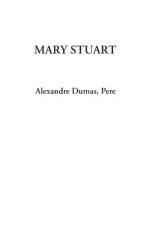The queen performed all this with great composure and calmness, with no apparent change of countenance; so that it seemed as if she were only preparing for a journey or change of dwelling; then she again bade her servants farewell, consoling them and exhorting them to live in peace, all this while finishing dressing as well and as elegantly as she could.
Her toilet ended, the queen went from her reception-room to her ante-room, where there was an altar set up and arranged, at which, before he had been taken from her, her chaplain used to say mass; and kneeling on the steps, surrounded by all her servants, she began the communion prayers, and when they were ended, drawing from a golden box a host consecrated by Pius V, which she had always scrupulously preserved for the occasion of her death, she told Bourgoin to take it, and, as he was the senior, to take the priest’s place, old age being holy and sacred; and in this manner in spite of all the precautions taken to deprive her of it, the queen received the holy sacrament of the eucharist.
This pious ceremony ended, Bourgoin told the queen that in her will she had forgotten three people—Mesdemoiselles Beauregard, de Montbrun, and her chaplain. The queen was greatly astonished at this oversight, which was quite involuntary, and, taking back her will, she wrote her wishes with respect to them in the first empty margin; then she kneeled down again in prayer; but after a moment, as she suffered too much in this position, she rose, and Bourgoin having had brought her a little bread and wine, she ate and drank, and when she had finished, gave him her hand and thanked him for having been present to help her at her last meal as he was accustomed; and feeling stronger, she kneeled down and began to pray again.
Scarcely had she done so, than there was a knocking at the door: the queen understood what was required of her; but as she had not finished praying, she begged those who were come to fetch her to wait a moment, and in a few minutes’ she would be ready.
The Earls of Kent and Shrewsbury, remembering the resistance she had made when she had had to go down to the commissioners and appear before the lawyers, mounted some guards in the ante-room where they were waiting themselves, so that they could take her away by force if necessary, should she refuse to come willingly, or should her servants want to defend her; but it is untrue that the two barons entered her room, as some have said. They only set foot there once, on the occasion which we have related, when they came to apprise her of her sentence.
They waited some minutes, nevertheless, as the queen had begged them; then, about eight o’clock, they knocked again, accompanied by the guards; but to their great surprise the door was opened immediately, and they found Mary on her knees in prayer. Upon this, Sir Thomas Andrew, who was at the time sheriff of the county of Nottingham, entered alone, a white wand in his hand, and as everyone stayed on their knees praying, he crossed the room with a slow step and stood behind the queen: he waited a moment there, and as Mary Stuart did not seem to see him—




